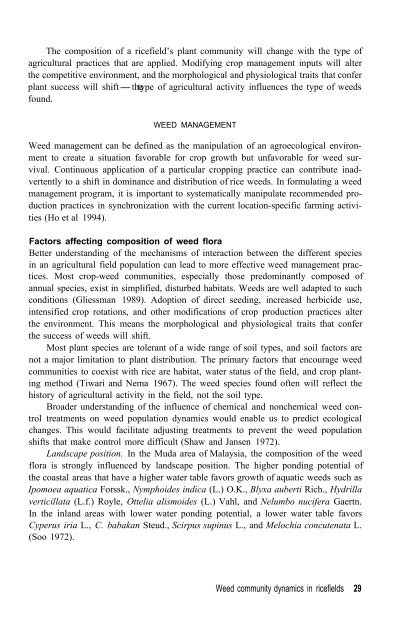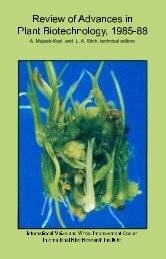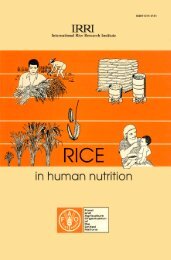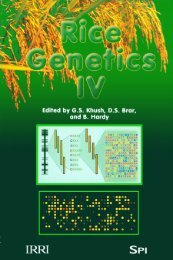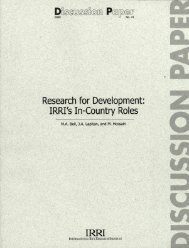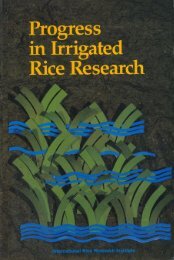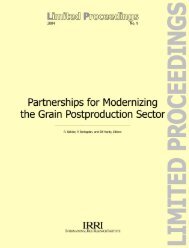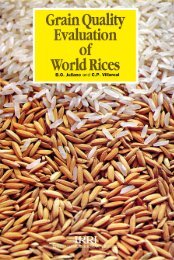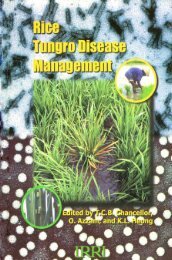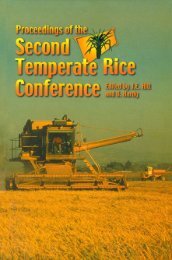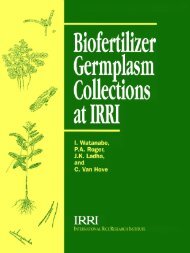HERBICIDES in Asian rice - IRRI books - International Rice ...
HERBICIDES in Asian rice - IRRI books - International Rice ...
HERBICIDES in Asian rice - IRRI books - International Rice ...
You also want an ePaper? Increase the reach of your titles
YUMPU automatically turns print PDFs into web optimized ePapers that Google loves.
The composition of a <strong>rice</strong>field’s plant community will change with the type of<br />
agricultural practices that are applied. Modify<strong>in</strong>g crop management <strong>in</strong>puts will alter<br />
the competitive environment, and the morphological and physiological traits that confer<br />
plant success will shift-the type of agricultural activity <strong>in</strong>fluences the type of weeds<br />
found.<br />
WEED MANAGEMENT<br />
Weed management can be def<strong>in</strong>ed as the manipulation of an agroecological environment<br />
to create a situation favorable for crop growth but unfavorable for weed survival.<br />
Cont<strong>in</strong>uous application of a particular cropp<strong>in</strong>g practice can contribute <strong>in</strong>advertently<br />
to a shift <strong>in</strong> dom<strong>in</strong>ance and distribution of <strong>rice</strong> weeds. In formulat<strong>in</strong>g a weed<br />
management program, it is important to systematically manipulate recommended production<br />
practices <strong>in</strong> synchronization with the current location-specific farm<strong>in</strong>g activities<br />
(Ho et al 1994).<br />
Factors affect<strong>in</strong>g composition of weed flora<br />
Better understand<strong>in</strong>g of the mechanisms of <strong>in</strong>teraction between the different species<br />
<strong>in</strong> an agricultural field population can lead to more effective weed management practices.<br />
Most crop-weed communities, especially those predom<strong>in</strong>antly composed of<br />
annual species, exist <strong>in</strong> simplified, disturbed habitats. Weeds are well adapted to such<br />
conditions (Gliessman 1989). Adoption of direct seed<strong>in</strong>g, <strong>in</strong>creased herbicide use,<br />
<strong>in</strong>tensified crop rotations, and other modifications of crop production practices alter<br />
the environment. This means the morphological and physiological traits that confer<br />
the success of weeds will shift.<br />
Most plant species are tolerant of a wide range of soil types, and soil factors are<br />
not a major limitation to plant distribution. The primary factors that encourage weed<br />
communities to coexist with <strong>rice</strong> are habitat, water status of the field, and crop plant<strong>in</strong>g<br />
method (Tiwari and Nema 1967). The weed species found often will reflect the<br />
history of agricultural activity <strong>in</strong> the field, not the soil type.<br />
Broader understand<strong>in</strong>g of the <strong>in</strong>fluence of chemical and nonchemical weed control<br />
treatments on weed population dynamics would enable us to predict ecological<br />
changes. This would facilitate adjust<strong>in</strong>g treatments to prevent the weed population<br />
shifts that make control more difficult (Shaw and Jansen 1972).<br />
Landscape position. In the Muda area of Malaysia, the composition of the weed<br />
flora is strongly <strong>in</strong>fluenced by landscape position. The higher pond<strong>in</strong>g potential of<br />
the coastal areas that have a higher water table favors growth of aquatic weeds such as<br />
Ipomoea aquatica Forssk., Nymphoides <strong>in</strong>dica (L.) O.K., Blyxa auberti Rich., Hydrilla<br />
verticillata (L.f.) Royle, Ottelia alismoides (L.) Vahl, and Nelumbo nucifera Gaertn.<br />
In the <strong>in</strong>land areas with lower water pond<strong>in</strong>g potential, a lower water table favors<br />
Cyperus iria L., C. babakan Steud., Scirpus sup<strong>in</strong>us L., and Melochia concutenata L.<br />
(Soo 1972).<br />
Weed community dynamics <strong>in</strong> <strong>rice</strong>fields 29


